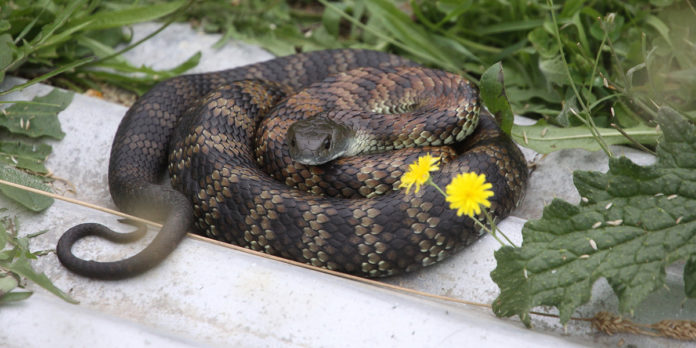As the weather warms up so do Australia’s snakes, but experts say there is no cause for alarm if you know what to do.
University of Melbourne researchers are proud partners in the launch of International Snakebite Awareness Day, which aims to raise awareness of the global scale of snakebite injuries and to highlight ways they can be prevented.
The World Health Organization estimates that between 81 000 and 138 000 people around the world die each year from venomous snakebite and up to 400 000 are left with permanent disabilities.
University of Melbourne researchers said Australian cities are encroaching into snake habitats, which means residents are more likely to encounter them – particularly in spring.
Australian Venom Research Unit Postdoctoral Research Fellow Timothy Jackson said snakes are “ectotherms”, which means they get their heat from external sources.
“As it warms up and we get a bit more sun, snakes come out to bask,” Dr Jackson said.
“When they’re warm enough, they get hungry – they may not have eaten for months. They get other urges too … spring is the season for love.”
Dr Jackson said with snakes on the move, people and their pets are more likely to see them, increasing the need for people to be “snake sensible”.
“This is nothing to be alarmed about, but it does give us an additional reason to pay attention to our surroundings because, as we all know, encounters with snakes don’t always end well,” he said.
“It’s important to understand that this isn’t because snakes are out to get us. The last thing a snake wants to see when it’s out looking for a feed is a giant primate, dog, or cat. It’s also not because warm snakes are more dangerous or aggressive.
“In fact, a warm snake is more likely than a cold one to trust in its ability to escape, which, given the opportunity, is exactly what they will do. On the other hand, accidents do happen, so it’s important to be snake sensible in spring.”
How to be snake sensible in spring
- Pay attention to your surroundings – snakes show up in the suburbs as well as the bush.
- Leave snakes alone. They want nothing to do with you and snakebites to humans and pets are defensive.
- Closely monitor pets and children, don’t let them explore snakey areas (e.g. long grass or dense vegetation) unsupervised.
- Wear appropriate footwear and long pants in the bush, and gloves when gardening.
- Clean up around the home. Snakes like to stay hidden, so having long grass and piles of wood or rubbish near the house is extending an invitation for them to visit.
- Control rodent infestations – where there’s snake food, there are snakes.
- Know first-aid. Click here for some tips.
- Most importantly, keep calm and enjoy Australia’s unique wildlife.
(Source: The University of Melbourne)










